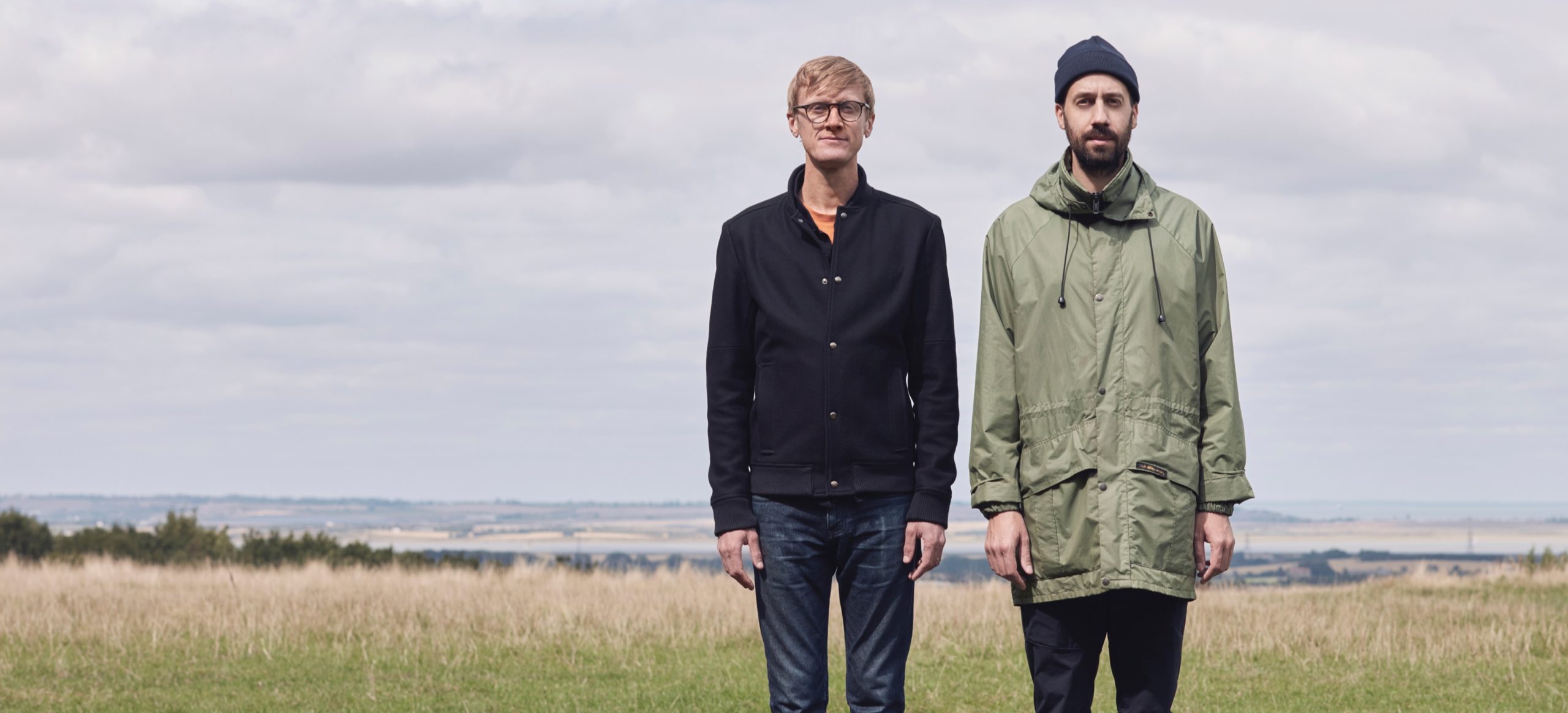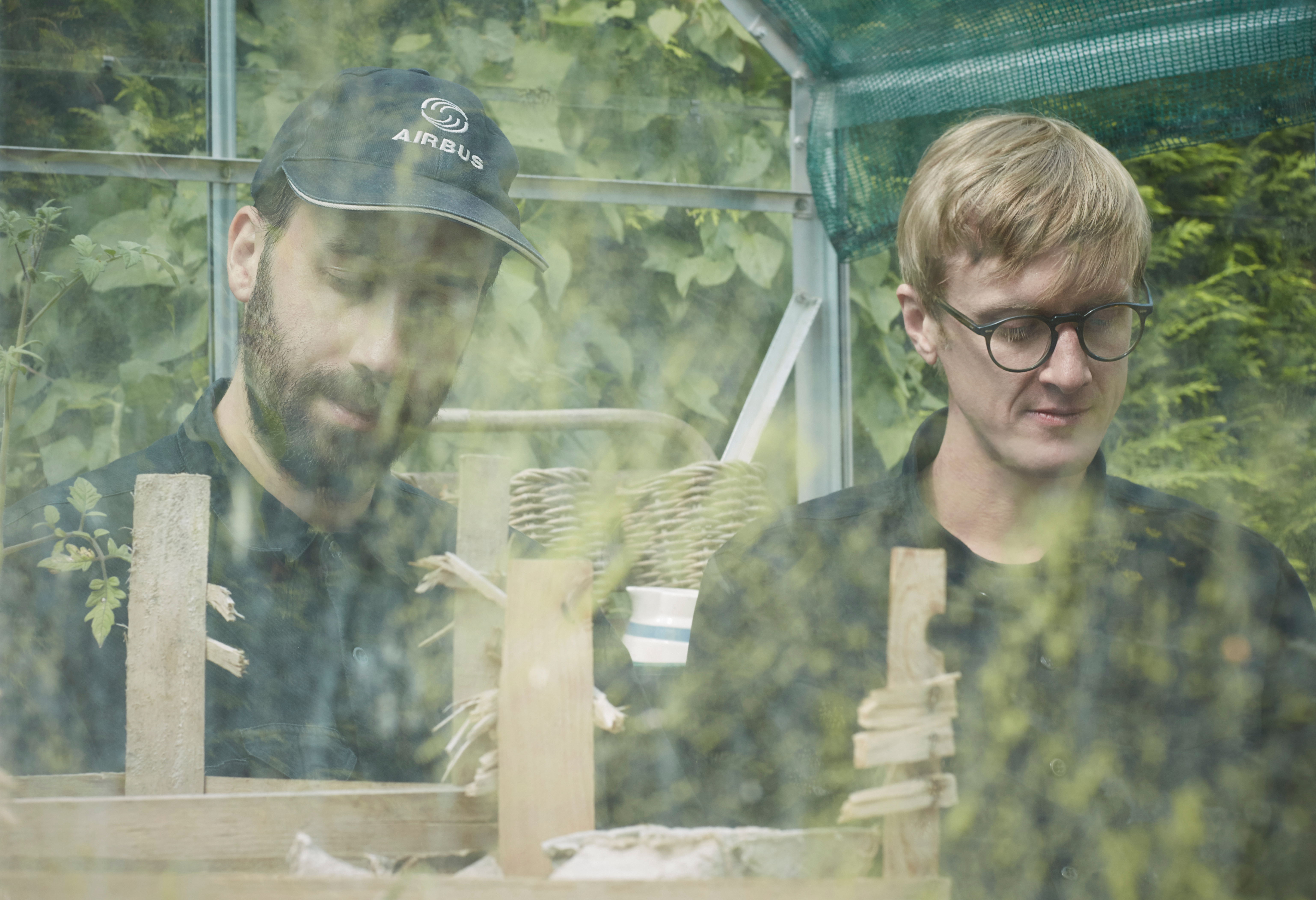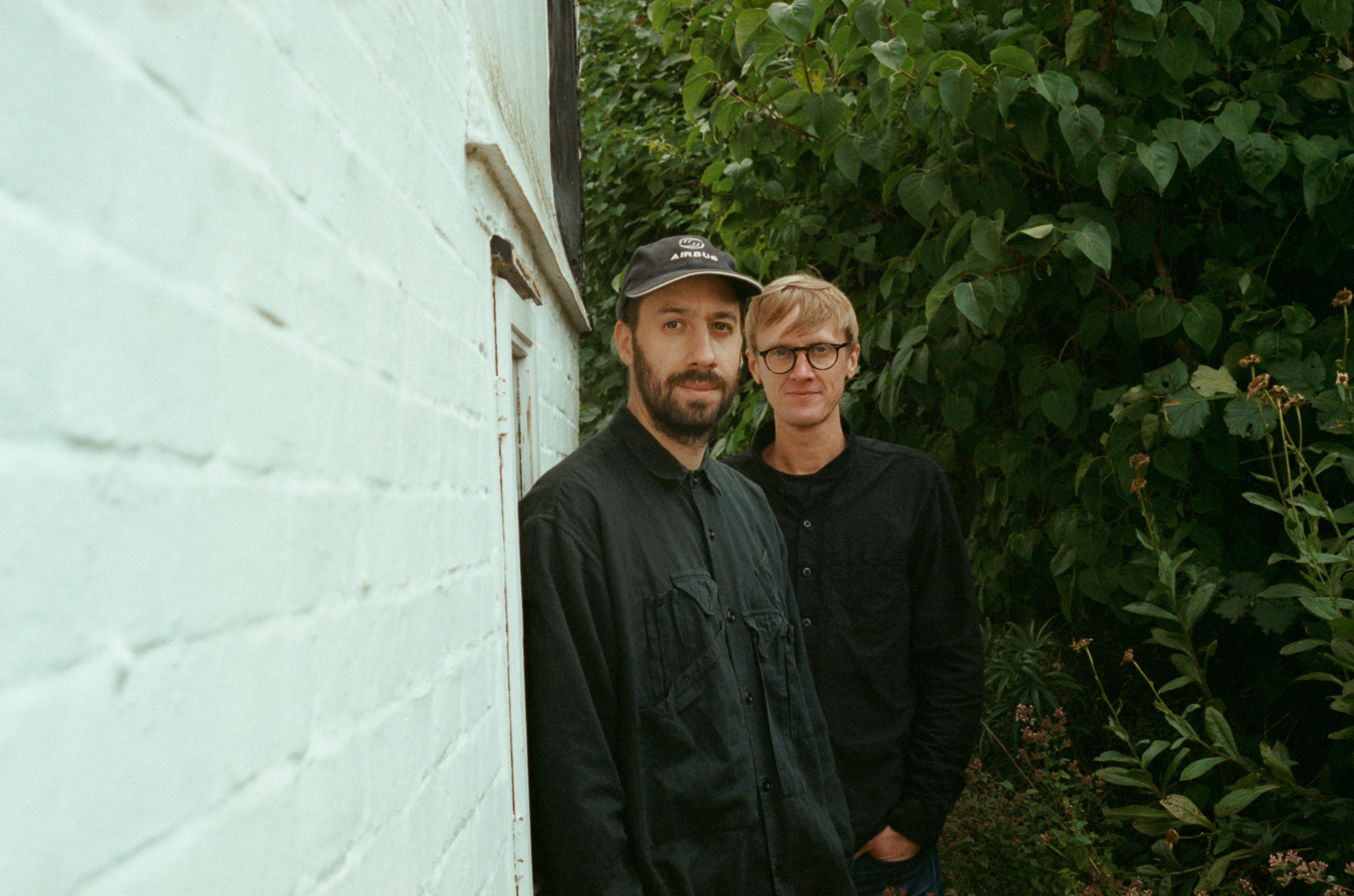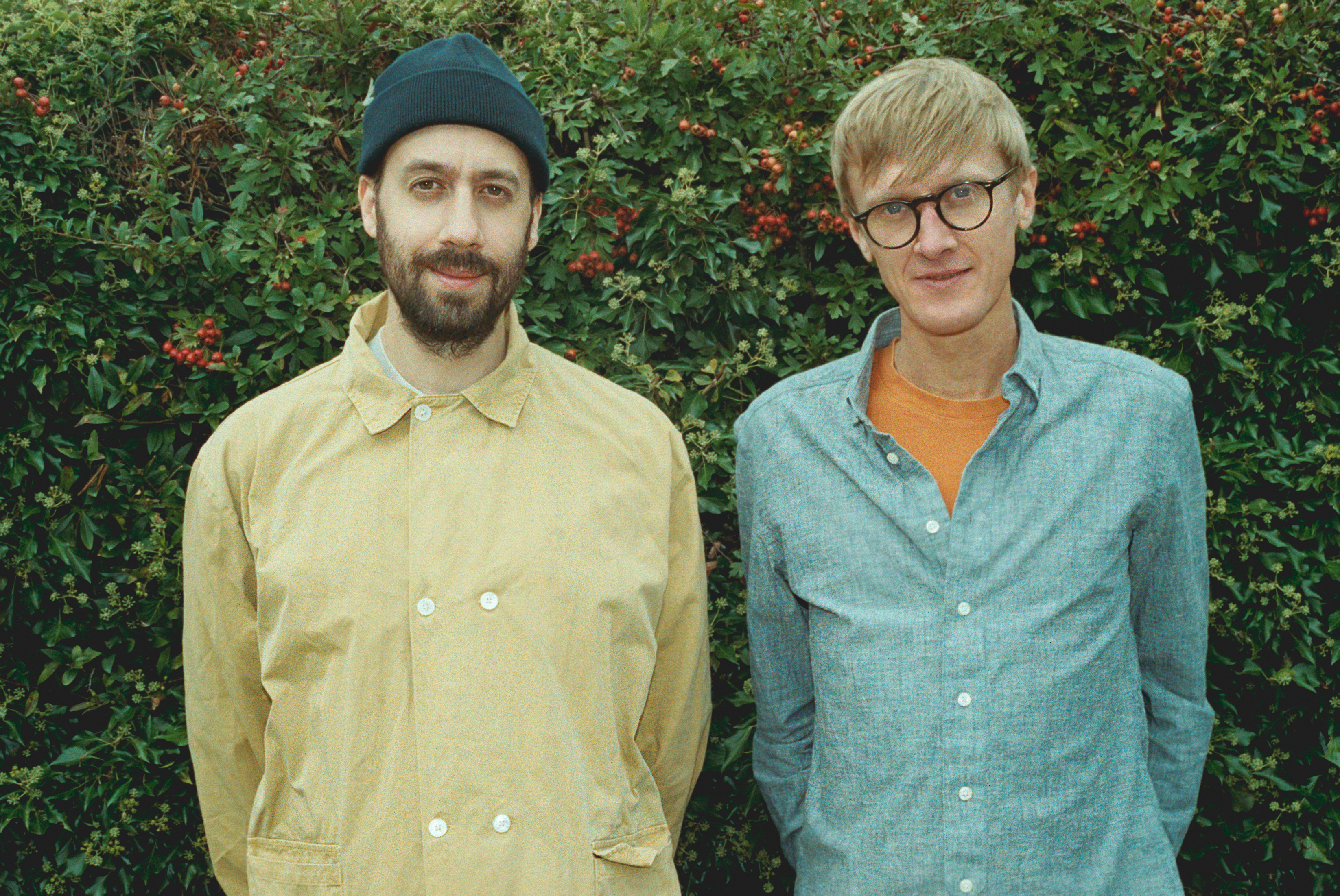20 Questions: Selling
Quick-fire questions with Derwin Dicker and Jas Shaw.

20 Questions: Selling
Quick-fire questions with Derwin Dicker and Jas Shaw.
Late last year, Derwin Dicker (a.k.a Gold Panda) and Jas Shaw, one half of Simian Mobile Disco, joined forces for a new album as Selling. The release, out now via City Slang, was recorded in Shaw’s studio, a converted barn at his home in Kent, “in between eating sandwiches,” during a period when he was undergoing chemotherapy treatment after a diagnosis of AL amyloidosis forced him to cancel a Simian Mobile Disco tour. Across its concise nine tracks and 42 minutes, On Reflection moves seamlessly from undulating, driving washed-out techno to sweet, shimmering electronics.
Having first met a decade ago, Dicker and Shaw have prior history together: Shaw has mixed two Gold Panda records, including the breakthrough debut Lucky Shiner. In between, Gold Panda and Simian Mobile Disco played shows together in the UK, USA, and Japan—so further collaboration was a natural progression. “Selling was made for fun, really as an excuse to get Derwin to come to my house and drink tea. I like to think that enjoyment is audible in the record,” Shaw notes. Additionally, Shaw was drawn into working with someone who could offer a different way of creating in the studio, given he already has a successful and enjoyable partnership with his lifelong Simian Mobile Disco partner, James Ford. “I have always enjoyed how natural and unschooled Derwin’s approach to music is. I know that sounds like some sort of veiled insult but it’s not at all, electronic music is littered with well constructed, sensibly arranged tracks that follow a logical harmonic theme, almost all of that music can get fucked.”
On Reflection ultimately grew from a series of sounds and ideas that were quickly recorded and then edited down to their purest form. It’s a record that exists in spontaneity and quick, gut decisions rather than any sort of laboriously plotted selection of notes and sounds. At the heart of it lies the Cirklon hardware synthesiser, and most tracks started with cheap ’90s rack-mount synths, the type that can be bought on Ebay for £30. “Even though these are totally digital they really have a distinctive character to them, kind of grainy and shit but in a charming way,” the duo explain.
To learn more about the release and the duo behind it, XLR8R dialled in Shaw and Dicker one wintery afternoon for a quick-fire 20 Questions.
01. What have you both been up to lately?
Dicker (Gold Panda): I’ve been doing some classes in programming, Python and stuff like that.
Jas Shaw: Recently I’ve been making loads of techno, probably to make up for the fact that I’ve not been able to go to clubs for ages and I miss it. Really lately, like today, I’ve rebuilt my first modular rig so that I can do polyphonic stuff with it, so it’s a mixture of swearing (when it’s not working) and cheering (when things work.) Next up is to try to get micro-tuning working.
02. What was the first record you ever bought and the story behind it?
J: Tapes, I bought two tapes. I bought a copy of Slippery When Wet and also Raising Hell. So that’s kind of shameful and cool. What’s nice, in retrospect, is that I bought both records for the same reason: that they seemed like they would have swearing on them, as good a reason as any to buy an album. I’m sad to say that there is no swearing on the Selling record.
D: Actual vinyl record was Soul to Soul 12” Get A Life/Jazzie’s Groove. I was nine. I don’t know how I found out about it, maybe from listening to Choice FM or something. My Dad had records and I knew of record shops, because there was one on Peckham High Street near Woolworths. I was used to the music section in Woolworths but this shop looked way cooler. I wasn’t nervous or anything. My Dad came in with me and I asked the guy behind the counter, he knew the record, and my Dad was pretty impressed. Also, The Best Of Pavarotti on cassette, that was from Woolworths.
03. What’s the last thing that made you laugh and why?
J: I just had a moment where I realised that getting into micro-tuning means I’m kind of an asshole and that’s kind of funny. I’m still going to mess around with micro-tuning anyway though. I should point out that I’m not living under the illusion that doing this might make the music I make anything like that of Aphex, though obviously no one would moan if it did. (It won’t!)

04. You’ve just released On Reflection, a collaborative record. I understand you guys have known each other for over a decade: where did you first meet and what’s the story behind the friendship?
Jas: I don’t remember the exact first time we met but I remember we did some gigs together and then I helped out on Derwin’s first record. Derwin would always claim that he didn’t know what he was doing but at the first gigs he used to just program all the patterns live on the MPC, just put it into record mode, and tap them in on the pads; it was amazing to watch. Frustratingly, this only made sense in venues where people could be right up close. Also, changing tracks took ages. He’s a wizard on that sampler.
D: Jas mixed Lucky Shiner and Half Of Where You Live but before that, I think we did some shows together in Japan, and I opened for Simian Mobile Disco at the Roundhouse in London. We just get on, it’s not too serious, have a laugh and make some music, eat some nice food.
05. How do you think it compares to your other respective projects?
J: I can’t do the describe music thing. I don’t know how you lot do it.
06. The press release talks about the fun and enjoyment you had making the record. Is it fun making music with no real agenda?
D: Yes.
J: Yep, definitely fun. This isn’t a new approach though, for either of us. James [Ford] and I more or less gave up the idea of prescriptive music plans as we would always get the opposite of what we aimed for. I think Derwin is the same: if you don’t have a set target then whatever you end up with is a direct hit; everyone needs a bit of encouragement like that when you are making music. Yeah, direct hit, again!
07. Did you find that you had two clearly defined roles in the studio? Who is better at what?
J: Not really. We recorded at my house so I did the engineering side of it but honestly, it’s not rocket science, recording synths; if we had been at Derwin’s then he would have pressed the buttons. The way we were recording meant that if you give everything a track, arm it, and press record when something cool happens, that’s all that needs doing. Both of us are good at the synth stuff but Derwin has an almost superhuman patience for rack synths with fading LCD screens and annoying menu-driven interfaces. One particular synth ended up being the main sound palette for the album and, because it never got much use before, it was at the very bottom of a rack, almost on the floor. In order to use it, Derwin had to lie on the floor in a strange, stressful looking position. It never seemed to bother him at all.
D: I think we have a similar way of working. We set a bunch of equipment up and kept messing with the sequences and sounds until it surprised us and then we hit record and jammed for a bit. It’s the unexpected we are looking for. Jas is way better at sitting in front of the computer and arranging and editing all the bits together; I tend to drift off, plus it’s his studio so he has to sit in that chair. If his wife came in and found me in that chair it would be weird!
08. What’s your favorite track from the album and why?
J: I really like “Keeping Txme.” It hinges around the grim ‘90s rack synth that I mentioned earlier but, and to make it more fun, I set up a MIDI controller for it. The old CPU in it can’t keep up with heavy activity so if you turn two knobs at the same time on the controller it would kind of choke in a way that was equal parts annoying and charming.
D: “Dicker’s Dream” because it’s named after me but also because it’s probably the furthest from a Gold Panda track.
09. How do you find working collaboratively rather than as a solo artist, Derwin?
D: Half the work, double the results!
10. Jas, what’s it like working with Derwin rather than James Ford? Did it open up all different musical pathways?
D: Double Jas!
J: It was not a world away from working with James; all three of us are pretty even-tempered in the studio, and, though I’ve known James twice as long, I’ve still known Derwin ages; long enough that we don’t need to tiptoe around each other. I guess the main thing was that although we use fairly different gear and make different music our approach to making music is fairly similar: both of us just muddle through until something interesting happens. My studio is in the middle of nowhere and at my house so I’ve always made a rule to only invite people over who are nice, nice enough to put up with my kids and dogs and the chaos that generates. I know that sounds like an obvious thing but the music industry is littered with people who are a pain to hang out with, and no one needs that in their home.
11. What’s the story behind the album name, On Reflection?
J: This is one for Derwin, he did the majority of the word stuff.
D: Just looking back over what we’d made really. Plus a lot of tracks had a nice mirroring quality in the sounds and sequence.

12. Speaking generally, do you think carefully about how your music is received or do you try to keep it a selfish endeavor?
J: The main thing for me is to avoid second-guessing things. If you start making music based on what you think other people think then that’s got to end in tears. Selfishly, I do want the process to be fun and the mechanism for making music to be interesting but that doesn’t mean that I don’t care what people think. What you are shooting for is for other people to get the same feeling that you had when you first heard the thing come together, and if they don’t then that knocks your confidence a bit, I guess. You need relatively thick skin as sooner or later someone is going to say something really unpleasant about something that you put an awful lot of effort into; it’s not a nice feeling and I think that most of the time when people claim not to care at all they are just trying to insulate themselves from criticism, and who could blame them?
D: With Gold Panda, I over think it sometimes, and it’s a path to ruin. With On Reflection, we just had fun.
13. Derwin, it’s been some considerable time since you shared some Gold Panda material. What’s the status of the project?
D: I’m working stuff but also lots of stuff that isn’t Gold Panda. As Gold Panda I just played in Paris with Anoushka Shankar, it’ll be shown on France2 in December.
14. Which artists are inspiring you at the moment, and why?
J: Peder Mannerfelt and Rrose are great. I love how the Mannerfelt stuff sounds like he’s trying to make rave music but throwing it all in the bin every time it sounds like rave music. And Rrose, well it’s not really music, it’s just sound; in fact, I’ll go the other way, it’s sound and not just music.
15. What musical genre is played most in your homes outside of the studio?
J: Most of the DJs I know are proud to say that they don’t listen to much techno at home, this is a good thing as just listening to the same stuff means that there are no outside influences getting thrown into the pot. I can’t claim this though, I like increasingly fast techno and drone, I really should get out more.
D: There isn’t one genre. I’ve been buying used CDs at the moment because they are dirt cheap, excellent quality, and easier to store than vinyl, plus I can play them in the car. My girlfriend usually puts the radio on.

16. What are your favorite albums at the moment?
J: The new Yamoaka album is all manner of lovely, also the Stephen Lopkin album and the Barker EP on Ostgut is exceptional. That’s an EP but it’s so good I think it gets a pass to be mentioned in with albums.
17. If you had to make a compilation album for early morning chill-out, name three tracks that would be on it?
D: I don’t have to and I won’t, haha!
J: The phrase chill-out has made my nose run a bit but let’s lean into this: I’d definitely put some Claude Young Jr. on, maybe Cryosleep Dreams. For ease of assembly, the A Made Up Sound record called At Klangendum is all one piece and though it’s not all super mellow it’s great stuff and 45 minutes long, mix done. If I get one more I’d put “Intra-8” by Mark Fell on, he’s the best.
18. If you were to be stuck on a deserted island for many years, what book and record would take with you, and why?
J: I know it’s a bit like putting “I like reading” on your CV but I do like Autechre, obviously, so either Amber, for nostalgic reasons, or the Elseq album/thing. As for a book, anything I’ve not read yet, as there’s no point in taking something I’ve already read, that would be a waste.
19. If you could have dinner with anyone, alive or dead, who would it be and why?
J: Obviously Bowie, around the Ziggy period. I bet he wouldn’t eat much either so I’d get two dinners and a strange conversation.
D: Dinner with the dead? Pretty unhygienic. Maybe it’d be like that dinner scene from the film “Braindead,” although technically I guess they’re the living-dead.
20. What’s the first thing you’ll do after answering these questions?
D: Email them back to you.
J: Glamorously, I will re-download a synth manual and read it, I don’t know how people who claim never to read manuals get anything done; they just paw at the instrument until it does what they want? Although I know that reading synth manuals isn’t press-worthy chat, I do think it comes from the fact that I still find studio tackle completely fascinating and I stand by the theory that you can get a song out of reading a chapter of a synth manual. There’s always something in there that you realize you can mess with and it might, with luck, do something musical. Poor old Bowie, having dinner with me…
Support Independent Media
Music, in-depth features, artist content (sample packs, project files, mix downloads), news, and art, for only $3.99/month.

